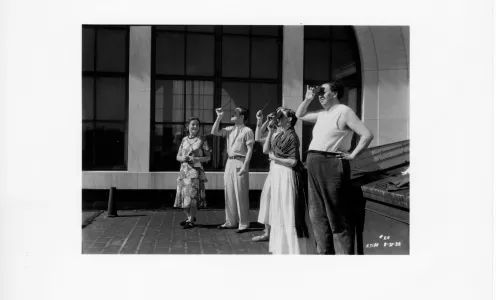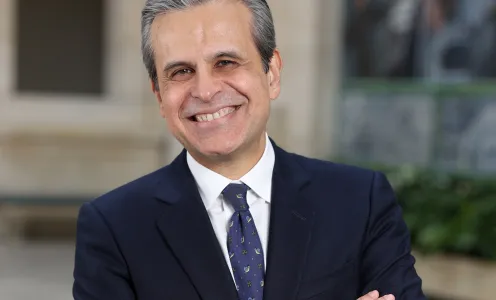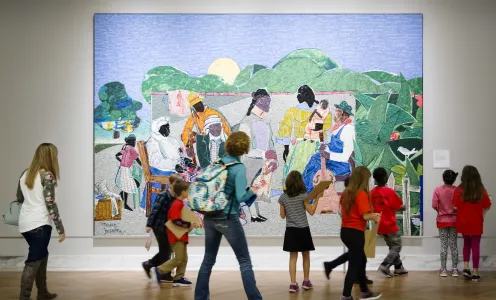Director's Letter, December 2016
Updated Jul 20, 2022
When I became director last year, friends and patrons congratulated me and also wanted to give me advice. They had seen the museum evolve for many years, so I was eager to hear what they had to say and learn from their experiences and observations. I remember many of the conversations and how some issues were recurrent and indicated a path of action. Other comments were unique and enlightened unexpected avenues. Of those, I especially remember one from our patron Jeff Antaya, who advised me, among many things, "to join the clowns." At first, I did not understand what he meant, so he kindly clarified and described the Distinguished Clown Corps at Detroit's Parade Company (http://theparade.org/(opens in new window)). I thought he was joking (Jeff is one of the clowns) and told him that I would think about it. Of course, I understand that people react to clowns in many different ways, but in my view they bring humor into our lives.
I believe in the benefits of humor, which is so authentically related to human nature. The thirteenth-century Persian poet Rumi (http://www.npr.org/templates/story/story.php?storyId=14775838(opens in new window)) urges us to remember "the original clay," referring to the religious belief that God (whatever one's faith) created humans from clay, a humble medium. The word humor comes from the Latin "humor" and means moisture, specifically that exuded by clay, and in Latin, clay is "humus." Thus, "humus" and "humor" are so closely related to our human nature that when one is in a good humor, one feels good in one's skin (or clay) and connected to others. Humor is a connector, a tool to solve problems, and I use it as often as I can. For instance, when someone comes to me with a problem, I point out the DIA's painting by Gilda Snowden hanging in my office entitled Twin Tornados (http://www.dia.org/object-info/5802ced8-1d74-43f1-845e-beaad10095f6.aspx...(opens in new window)) and jokingly remind them that I already have a couple of "tornados" nearby. Immediately, the tension loosens. Cracking a smile at the outset of any endeavor helps bring the team together and steers us toward success. Try it! Start a meeting, a speech, or anything with humor and you will feel at one with the audience.
With a smile, I followed Jeff's advice and joined the Distinguished Clown Corps (right). Thanks to it, I met so many fun, new people and lovers of our Detroit culture and heritage. What a joy we felt inside the museum, when the clowns warmed up in the DIA's Great Hall with some hot drinks before we walked down Woodward in the Thanksgiving parade. The DIA "temple of art" was transformed into a "temple of clowns" and became part of Detroit's parade. Our security team took photos with lots of clowns, including me, and some said they could now say that "their director is a clown." We all laughed and felt like one. Joining the clowns has brought new humor and friends into my life, helped me make others laugh, and brought the DIA closer to our community through a Thanksgiving tradition. What a good reason to give thanks.
When I became director last year, friends and patrons congratulated me and also wanted to give me advice. They had seen the museum evolve for many years, so I was eager to hear what they had to say and learn from their experiences and observations. I remember many of the conversations and how some issues were recurrent and indicated a path of action. Other comments were unique and enlightened unexpected avenues. Of those, I especially remember one from our patron Jeff Antaya, who advised me, among many things, "to join the clowns." At first, I did not understand what he meant, so he kindly clarified and described the Distinguished Clown Corps at Detroit's Parade Company (http://theparade.org/(opens in new window)). I thought he was joking (Jeff is one of the clowns) and told him that I would think about it. Of course, I understand that people react to clowns in many different ways, but in my view they bring humor into our lives.
I believe in the benefits of humor, which is so authentically related to human nature. The thirteenth-century Persian poet Rumi (http://www.npr.org/templates/story/story.php?storyId=14775838(opens in new window)) urges us to remember "the original clay," referring to the religious belief that God (whatever one's faith) created humans from clay, a humble medium. The word humor comes from the Latin "humor" and means moisture, specifically that exuded by clay, and in Latin, clay is "humus." Thus, "humus" and "humor" are so closely related to our human nature that when one is in a good humor, one feels good in one's skin (or clay) and connected to others. Humor is a connector, a tool to solve problems, and I use it as often as I can. For instance, when someone comes to me with a problem, I point out the DIA's painting by Gilda Snowden hanging in my office entitled Twin Tornados (http://www.dia.org/object-info/5802ced8-1d74-43f1-845e-beaad10095f6.aspx...(opens in new window)) and jokingly remind them that I already have a couple of "tornados" nearby. Immediately, the tension loosens. Cracking a smile at the outset of any endeavor helps bring the team together and steers us toward success. Try it! Start a meeting, a speech, or anything with humor and you will feel at one with the audience.
With a smile, I followed Jeff's advice and joined the Distinguished Clown Corps (right). Thanks to it, I met so many fun, new people and lovers of our Detroit culture and heritage. What a joy we felt inside the museum, when the clowns warmed up in the DIA's Great Hall with some hot drinks before we walked down Woodward in the Thanksgiving parade. The DIA "temple of art" was transformed into a "temple of clowns" and became part of Detroit's parade. Our security team took photos with lots of clowns, including me, and some said they could now say that "their director is a clown." We all laughed and felt like one. Joining the clowns has brought new humor and friends into my life, helped me make others laugh, and brought the DIA closer to our community through a Thanksgiving tradition. What a good reason to give thanks.


